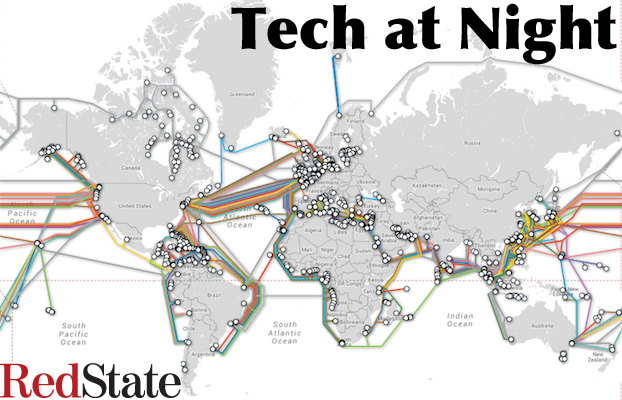Tech at Night: The LOCAL TV Act needs retooling

Well here’s an interesting development. Deb Fischer is no Ted Cruz but Heritage Action does have her slightly above average for a Republican Senator. So it caught my eye to see that she’s working with Cory Booker on the LOCAL TV Act, which would direct the FCC to study how it divides up the country into “Designated Market Areas” (DMAs) to see how some areas might be poorly served by that.
Then I saw the intent, and I think it needs some work.
Continue reading »
Tech at Night: How government picks winners and losers in broadcasting

Conservatives often talk about how government picks winners and losers, but sometimes it’s important to discuss just how that is done. It’s easy to see in cases like Solyndra where government picks winners, but sometimes it’s harder to see when government is making one industry win at the expense of another.
Laws related to technology are full of examples like that, and tonight I’m going to illustrate two important ways government makes broadcasters winners at the expense of cable companies and content producers.
Continue reading »
Tech at Night: Will Google and the rest of the far left shoot down Net Neutrality 3.0?

I asked back in February of last year, which seems like forever ago, whether Google would end up remaining a left-wing outfit. As it turns out, they’re joining the Occupy radical left claiming the Obama administration’s new Net Neutrality plans don’t go far enough. These radicals are flipping out because they won’t be happy until we get single payer Internet. So whether the left shoots down Chairman Tom Wheeler’s vote on Net Neutrality 3.0 remains to be seen.
Will the Obama FCC dance to the tune set by the furthest left wing of the President’s party, in an election year where the electorate is going to be much further to the right than the one that re-elected the President?
Continue reading »
Tech at Night: We now have a horde to go with our Zombie Net Neutrality

So Zombie Net Neutrality keeps on chugging along. Leftist opposition to it is growing because it contains one small nod to reality, letting people in one narrow case pay for what they use. Of course this hurts the companies who want to use lots of bandwidth but want to have that cost subsidized by everyone else. It’s funny how the left freaks out when some industries lobby, but for some reason Internet firms get a free pass.
Amusingly enough, these same leftys are going full Occutard and even getting FCC Democrats to waver. The goal of the radicals here is to eliminate any sort of idea that people should pay for what they use, making Internet investment unsustainable, and generate a pretext later for socialized Internet as a “human right.” Sound familiar? This is the same playbook used in Obamacare.
Continue reading »
Tech at Night: Broadcasters are some of the worst rent seekers in DC. USPS picking winners and losers.

The longer you look at regulatory policy in this country, the more you run into special interests looking out for their own personal payoffs. But seriously, I feel like terrestrial broadcasters are the worst of all when it comes to acting entitled. Waah waah we’re big fat socialists and we don’t want to have to pay the people who made the stuff we’re broadcasting. Meanwhile, Waah waah we want to restrict competition amongst ourselves to retransmit our broadcasts on cable.
Virtually every company, every industry I write about in this space goes around lobbying in DC for some advantage. But nobody gets so many special protections and is so rabid in protecting them at any cost, as terrestrial broadcasters. At some point, small government folks are going to have to smash this racket.
Continue reading »
Tech at Night: Why ACU and other STELA opponents are wrong. SXSW goes hard left.

ACU and other normally small-government types have bafflingly come out against the satellite TV bill STELA, and Steve Scalise’s efforts to enact Retransmission Consent reform, a cable idea first proposed jointly with Jim DeMint. This is wrong, and this is a strange supporting of laws that pick winners and losers.
You see, back in the 70s when Cable TV started to take off, broadcasters and socialists alike freaked out. Broadcasters because they were faced with competition for eyeballs where they previously had a monopoly, and socialists because it offended that someone might actually pay for TV. So they teamed up to rig the system, passing laws and regulations that prevented an open market for many broadcasts, instead creating territorial monopolies for broadcasters. These regulations have let the broadcasters get fat and happy (see also Aereo).
Pass retransmission consent reform. Supporters say without reform we “simulate” a free market, and to reform would harm “content producers.” This turns the truth on its head. Broadcasters are overpaid, underworked middlemen with government-manufactured monopolies. They produce nothing but just happen to hold a government license to spectrum. Make ’em compete. And certainly never make satellite providers buy from a propagandist like The Weather Channel.
Continue reading »
Tech at Night: Obama’s FCC transparency failure, video regulatory failure, Google censorship

Instead of the transparent Obama administration we were promised, from the Obama FCC, what we have here is failure to communicate.
We need to continue to cut the FCC out of the loop, the old regulations are harmful when it comes to retransmission consent and the whole cable company/local broadcaster nexus. Clear it out, deregulate, restore the free market, and the public will benefit.
Continue reading »
Tech at Night: Retransmission Consent, Spectrum, Reid making threats on Cybersecurity

When Jim DeMint and Steve Scalise first started talking about reforming the regulated relationship between broadcasters and cable companies, oh the fits that were thrown. Even a certain conservative group jumped out in front complaining. But look: these regulations are worth big bucks to the side they favor, and the negotiation deadlocks they produce don’t help the public, they only force everyone to deal with blackouts.
The comprehensive reform package commonly referred to as Retransmission Consent reform should pass. I wonder if FCC thinks it will, as it has begun by tweaking Must Carry rules itself, possibly as pre-emption?
Continue reading »
Tech at Night: FCC reform, Protecting buggy whip makers, Spectrum, Democrat hacks website

Imagine if we’d banned automobiles because all the old business models that were destroyed by them got government protection. Imagine a government that unfairly killed innovation in order to give well-connected businessmen a leg up on upstart competition. That’s what big media outlets are asking for when they come after Dish Network’s innovative DVR service. And of course, given the Obama administration’s track record of unfairly picking winners and losers, they might get what they want.
Continue reading »
Tech at Night: Q&A with with Steve Scalise on Retransmission Consent; Snyder backs Marketplace Fairness Act; Lieberman-Collins gets opposition

I know many RedState readers are big fans of Jim DeMint, so in my coverage of the Retransmission Consent debate, I’ve focused on him. However he’s not the whole story. This Congress, due to the TEA party-driven Republican majority, it’s been the House where our major regulatory reform successes have happened. And it’s Steve Scalise, Republican of Louisiana and Bobby Jindal’s successor in the House, who is the champion of the Next Generation TV Marketplace Act there.
However I know that there have been skeptics on this reform, so I was fortunately able to snag some of the Congressman’s time, and ask him a few questions about the proposed reforms. Catch his answers below the fold.
Continue reading »